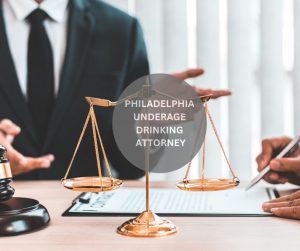Philadelphia Underage Drinking Lawyer
Underage drinking is a serious issue that has significant legal consequences. In the United States, the legal drinking age is 21, and anyone under this age is prohibited from consuming alcohol. This blog post will explore the legal implications of underage drinking, focusing on the laws in Pennsylvania.
What is Underage Drinking?
Underage drinking refers to the consumption of alcohol by individuals under the age of 21. This is considered illegal in all 50 states in the U.S., including Pennsylvania. The law is enforced through various statutes, such as 18 Pa.C.S. § 6308 in Pennsylvania, which makes it a summary offense for a person under the age of 21 to attempt to purchase, consume, possess, or knowingly and intentionally transport any liquor or malt or brewed beverages.
Consequences of Underage Drinking
The legal consequences of underage drinking can be severe. In Pennsylvania, for instance, a person convicted of underage drinking can face penalties such as fines, suspension of driving privileges, and even imprisonment in some cases.
Breath Testing in Underage Drinking Cases
Breath testing devices, often referred to as breathalyzers, are commonly used tools in law enforcement to determine if a person has consumed alcohol. In the context of underage drinking, these devices can provide evidence of alcohol consumption. However, the admissibility of such evidence in court can be a complex issue.
 In the case of Commonwealth v. Brigidi, 607 Pa. 329 (2010), the Supreme Court of Pennsylvania considered whether the results of a pre-arrest breath test could be admitted as evidence in an underage drinking prosecution. The court held that the Commonwealth could not rely on statutory and administrative approvals of pre-arrest breath testing devices pursuant to Section 1547 of the Vehicle Code to justify the admission of test results into evidence in prosecutions under the Crimes Code.
In the case of Commonwealth v. Brigidi, 607 Pa. 329 (2010), the Supreme Court of Pennsylvania considered whether the results of a pre-arrest breath test could be admitted as evidence in an underage drinking prosecution. The court held that the Commonwealth could not rely on statutory and administrative approvals of pre-arrest breath testing devices pursuant to Section 1547 of the Vehicle Code to justify the admission of test results into evidence in prosecutions under the Crimes Code.
The court noted:
“We agree with the Commonwealth that Section 1547 of the Vehicle Code generally does not apply to proceedings exclusively under the Crimes Code. Nevertheless, we hold that the Commonwealth also may not rely on statutory and administrative approvals of pre-arrest breath testing devices pursuant to Section 1547 of the Vehicle Code to justify the admission of test results into evidence in prosecutions under the Crimes Code.”
This ruling underscores the importance of understanding the legal nuances surrounding the use of breath testing devices in underage drinking cases.
Underage Drinking Lawyer Near Me
Underage drinking is a serious offense with significant legal consequences. Understanding the laws surrounding this issue, including the role of breath testing, is crucial for anyone involved in such a case. As always, it is recommended to consult with a legal professional for advice tailored to your specific circumstances.
Please note that this blog post is intended for informational purposes only and does not constitute legal advice. Always consult with a qualified attorney for legal advice.